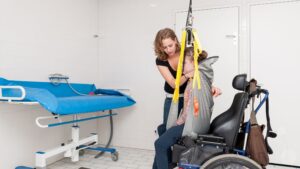Assistive Technology (AT) can vastly improve quality of life or increase independence for people living with disability. Home modifications no longer just means wide entrances, ramps, and grab bars. Today, technology advancements are truly improving safety and independence for all people including people with disability.
Consider technologies such as Alexa, which has made life easier by helping people complete tasks more efficiently. For example, the use of innovative technology for a person living with mobility impacts or physical disability can replace simple light switches with voice activated control of the environment using commands. So, how has technology changed the lives of people living with disability?
What is assistive technology?
Refers to any device, item, equipment or software program used to help complete tasks. NDIS assistive technology helps people living with disability improve or maintain their functional capabilities. Assistive technology can include various options, such as a canes, prosthetics, pencil holders, walkers, and tech gadgets.
Understanding assistive technology products
NDIS assistive technology ranges from simple products to more complex equipment and is categorized into three levels of complexity: low, mid, and high.
Low-risk AT products are:
- Generally available for purchase off the shelf at retail stores
- Not likely to cause harm in day-to-day life.
- Simple to set up and safe to use without professional advice
High-risk products are:
- More likely to cause harm
- Might be considered a restrictive practice
Have a requirement for assessment prior to approval and may require training for safe use.
How assistive technology providers are changing the lives of people with disability?
Assistive technology offers several benefits to support a person with disability. It is generally funded if it can be seen to improve the quality of life in the following ways:
Controlling the environment
Assistive technology may increase the level of control a person with a disability has over their environment. For example, when using app-controlled devices or voice-activated technology. These technologies can control the amount of light, temperature, and fresh air that enters a room. Making use of voice activation or app controls, the person may be able to turn the lights on and off, adjusting light settings, regulate temperatures, open and close blinds or doors or turn the TV on and off and switching between channels without requiring someone else in the environment to perform these everyday functions.
The app device thereby increasing independence and reducing the need for informal and paid supports.
Increases confidence
For some people, where independence is impacted by their disability, increased accessibility to Assistive Technology can result in more opportunities for independence. As a result, increased independence can lead to an increase in self-esteem and confidence.
Having the ability to make choices about the environment and take part in daily tasks can empower and create a sense of purpose. Knowing all this is possible with just a button allows a sense of security and builds confidence.
Reduces risk of accidents
Innovations, such as Artificial Intelligence (AI) technology, can add a layer of security. The availability of systems that can be controlled helps prevent the risks of potential accidents. For example, keyless doors give wheelchair users more security and independence. AT provides fast access to emergency services when needed.
In addition, automated blinds, windows, and lighting can work with the door locks to trigger goodbye and welcome home, while visual smoke alarms can support a person who has a hearing disability.
Increases privacy and dignity
The use of AT can reduce the need for help from others which will increase the persons privacy and dignity; especially in the area of personal care.
Lowers the cost of living
Intelligent technology solutions can multitask to reduce general costs. For instance, lighting control systems provide an access control system. They are also programmable to illuminate your home at a certain level to save energy costs.
Innovations have led to the production of assistive technologies which are modular. If you need to change, new devices can be introduced without changing or learning a new system. Innovations have also led to an increase in support worker or carer hours, which reduces the cost of funded supports in the person’s life while also increasing their social and personal participation.
What are some of the innovative assistive technologies?
- Intercom and security cameras
- Automated key-less entry, including facial recognition
- Automated bedroom doors
- Motorised blackout curtains or blinds
- Automatic doors
- Adjustable kitchen bench tops
- Smart lighting
- Voice activated technology
How AT is funded?
Your NDIS plan may already have funding for AT, check your NDIS plan under the categories Assistive Technology or CORE/Consumables (for Low Cost/Low Risk AT).
If you haven’t yet received AT funding and believe it would support you to improve your life, reach your goals and increase your independence, you can discuss this with your Allied Health providers to seek their professional guidance on what AT would be best for you. For some AT you will require an assessment from a provider (e.g. Occupational Therapist) prior to submitting a request or application to NDIS.
Once funded you can use the AT funds to:
- Purchase the technology
- Access the AT through rental, loan, subscription, or other arrangements
Always ensure you understand your support and plan before purchasing AT, if you are unsure please discuss your needs with your NDIS planner, Local Area Coordinator (LAC), Support Coordinator or Plan Manager.




